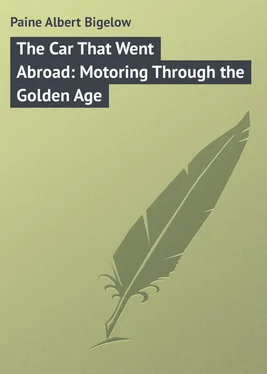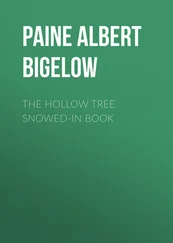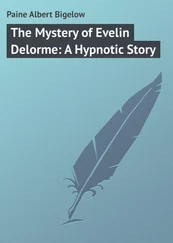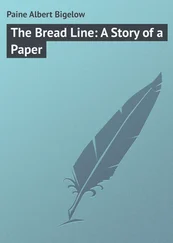Albert Paine - The Car That Went Abroad - Motoring Through the Golden Age
Здесь есть возможность читать онлайн «Albert Paine - The Car That Went Abroad - Motoring Through the Golden Age» — ознакомительный отрывок электронной книги совершенно бесплатно, а после прочтения отрывка купить полную версию. В некоторых случаях можно слушать аудио, скачать через торрент в формате fb2 и присутствует краткое содержание. Жанр: foreign_prose, Путешествия и география, на английском языке. Описание произведения, (предисловие) а так же отзывы посетителей доступны на портале библиотеки ЛибКат.
- Название:The Car That Went Abroad: Motoring Through the Golden Age
- Автор:
- Жанр:
- Год:неизвестен
- ISBN:нет данных
- Рейтинг книги:5 / 5. Голосов: 1
-
Избранное:Добавить в избранное
- Отзывы:
-
Ваша оценка:
- 100
- 1
- 2
- 3
- 4
- 5
The Car That Went Abroad: Motoring Through the Golden Age: краткое содержание, описание и аннотация
Предлагаем к чтению аннотацию, описание, краткое содержание или предисловие (зависит от того, что написал сам автор книги «The Car That Went Abroad: Motoring Through the Golden Age»). Если вы не нашли необходимую информацию о книге — напишите в комментариях, мы постараемся отыскать её.
The Car That Went Abroad: Motoring Through the Golden Age — читать онлайн ознакомительный отрывок
Ниже представлен текст книги, разбитый по страницам. Система сохранения места последней прочитанной страницы, позволяет с удобством читать онлайн бесплатно книгу «The Car That Went Abroad: Motoring Through the Golden Age», без необходимости каждый раз заново искать на чём Вы остановились. Поставьте закладку, и сможете в любой момент перейти на страницу, на которой закончили чтение.
Интервал:
Закладка:
Paine Albert Bigelow
The Car That Went Abroad: Motoring Through the Golden Age
PREFACE
Fellow-wanderer:
The curtain that so long darkened many of the world's happy places is lifted at last. Quaint villages, old cities, rolling hills, and velvet valleys once more beckon to the traveler.
The chapters that follow tell the story of a small family who went gypsying through that golden age before the war when the tree-lined highways of France, the cherry-blossom roads of the Black Forest, and the high trails of Switzerland offered welcome to the motor nomad.
The impressions set down, while the colors were fresh and warm with life, are offered now to those who will give a thought to that time and perhaps go happily wandering through the new age whose dawn is here.
A. B. P.June, 1921.
Part I
THE CAR THAT WENT ABROAD
Chapter I
DON'T HURRY THROUGH MARSEILLES
Originally I began this story with a number of instructive chapters on shipping an automobile, and I followed with certain others full of pertinent comment on ocean travel in a day when all the seas were as a great pleasure pond. They were very good chapters, and I hated to part with them, but my publisher had quite positive views on the matter. He said those chapters were about as valuable now as June leaves are in November, so I swept them aside in the same sad way that one disposes of the autumn drift and said I would start with Marseilles, where, after fourteen days of quiet sailing, we landed with our car one late August afternoon.
Most travelers pass through Marseilles hastily – too hastily, it may be, for their profit. It has taken some thousands of years to build the "Pearl of the Mediterranean," and to walk up and down the rue Cannebière and drink coffee and fancy-colored liquids at little tables on the sidewalk, interesting and delightful as that may be, is not to become acquainted with the "pearl" – not in any large sense.
We had a very good and practical reason for not hurrying through Marseilles. It would require a week or more to get our car through the customs and obtain the necessary licenses and memberships for inland travel. Meantime we would do some sight-seeing. We would begin immediately.
Besides facing the Old Port (the ancient harbor) our hotel looked on the end of the Cannebière, which starts at the Quai and extends, as the phrase goes, "as far as India," meaning that the nations of the East as well as those of the West mingle there. We understood the saying as soon as we got into the kaleidoscope. We were rather sober-hued bits ourselves, but there were plenty of the other sort. It was the end of August, and Marseilles is a semi-tropic port. There were plenty of white costumes, of both men and women, and sprinkled among them the red fezzes and embroidered coats and sashes of Algiers, Morocco, and the Farther East. And there were ladies in filmy things, with bright hats and parasols; and soldiers in uniforms of red and blue, while the wide pavements of that dazzling street were literally covered with little tables, almost to the edges. And all those gay people who were not walking up and down, chatting and laughing, were seated at the little tables with red and green and yellow drinks before them and pitchers of ice or tiny cups of coffee, and all the seated people were laughing and chattering, too, or reading papers and smoking, and nobody seemed to have a sorrow or a care in the world. It was really an inspiring sight, after the long, quiet days on the ship, and we loitered to enjoy it. It was very busy around us. Tramcars jangled, motors honked, truckmen and cabmen cracked their whips incessantly. Newswomen, their aprons full of long pockets stuffed with papers, offered us journals in phrases that I did not recognize as being in my French phonograph; cabmen hailed us in more or less English and wanted to drive us somewhere; flower sellers' booths lined both sides of a short street, and pretty girls held up nosegays for us to see. Now and then a beggar put out a hand.
The pretty drinks and certain ices we saw made us covetous for them, but we had not yet the courage to mingle with those gay people and try our new machine-made French right there before everybody. So we slipped into a dainty place – a pâtisserie boulangerie – and ordered coffee and chocolate ice cream, and after long explanations on both sides got iced coffee and hot chocolate, which was doing rather well, we thought, for the first time, and, anyhow, it was quite delicious and served by a pretty girl whose French was so limpid that one could make himself believe he understood it, because it was pure music, which is not a matter of arbitrary syllables at all.
We came out and blended with the panaroma once more. It was all so entirely French, I said; no suggestion of America anywhere. But Narcissa, aged fifteen, just then pointed to a flaming handbill over the entrance of a cinematograph show. The poster was foreign, too, in its phrasing, but the title, " L'aventures d'Arizona Bill " certainly had a flavor of home. The Joy, who was ten, was for going in and putting other things by, but we overruled her. Other signs attracted us – the window cards and announcements were easy lessons in French and always interesting.
By and by bouquets of lights breaking out along the streets reminded us that it was evening and that we were hungry. There were plenty of hotels, including our own, but the dining rooms looked big and warm and expensive and we were dusty and economical and already warm enough. We would stop at some open-air place, we said, and have something dainty and modest and not heating to the blood. We thought it would be easy to find such a place, for there were perfect seas of sidewalk tables, thronged with people, who at first glance seemed to be dining. But we discovered that they were only drinking, as before, and perhaps nibbling at little cakes or rolls. When we made timid and rudimentary inquiries of the busy waiters, they pointed toward the hotels or explained things in words so glued together we could not sort them out. How different it all was from New York, we said. Narcissa openly sighed to be back on "old rue de Broadway," where there were restaurants big and little every twenty steps.
We wandered into side streets and by and by found an open place with a tiny green inclosure, where a few people certainly seemed to be eating. We were not entirely satisfied with the look of the patrons, but they were orderly, and some of them of good appearance. The little tables had neat white cloths on them, and the glassware shone brightly in the electric glow. So we took a corner position and studied the rather elaborate and obscure bill of fare. It was written, and the few things we could decipher did not seem cheap. We had heard about food being reasonable in France, but single portions of fish or cutlets at ".45" and broiled chicken at "1.20" could hardly be called cheap in this retired and unpretentious corner. One might as well be in a better place – in New York. We wondered how these unfashionable people about us could look so contented and afford to order such liberal supplies. Then suddenly a great light came. The price amounts were not in dollars and cents, but in francs and centimes. The decimals were the same, only you divided by five to get American values. There is ever so much difference. 1 1 The old rates of exchange are used in this book.
The bill of fare suddenly took on a halo. It became almost unbelievable. We were tempted to go – it was too cheap to be decent. But we were weary and hungry, and we stayed. Later we were glad. We had those things which the French make so well, no matter how humble the place – " pot au feu, bouillabaisse " (the fish soup which is the pride of Marseilles – our first introduction to it), lamb chops, a crisp salad, Gruyère cheese, with a pint of red wine; and we paid – I try to blush when I tell it – a total for our four of less than five francs – that is to say, something under a dollar, including the tip, which was certainly large enough, if one could judge from the lavish acknowledgment of the busy person who served us.
Читать дальшеИнтервал:
Закладка:
Похожие книги на «The Car That Went Abroad: Motoring Through the Golden Age»
Представляем Вашему вниманию похожие книги на «The Car That Went Abroad: Motoring Through the Golden Age» списком для выбора. Мы отобрали схожую по названию и смыслу литературу в надежде предоставить читателям больше вариантов отыскать новые, интересные, ещё непрочитанные произведения.
Обсуждение, отзывы о книге «The Car That Went Abroad: Motoring Through the Golden Age» и просто собственные мнения читателей. Оставьте ваши комментарии, напишите, что Вы думаете о произведении, его смысле или главных героях. Укажите что конкретно понравилось, а что нет, и почему Вы так считаете.












